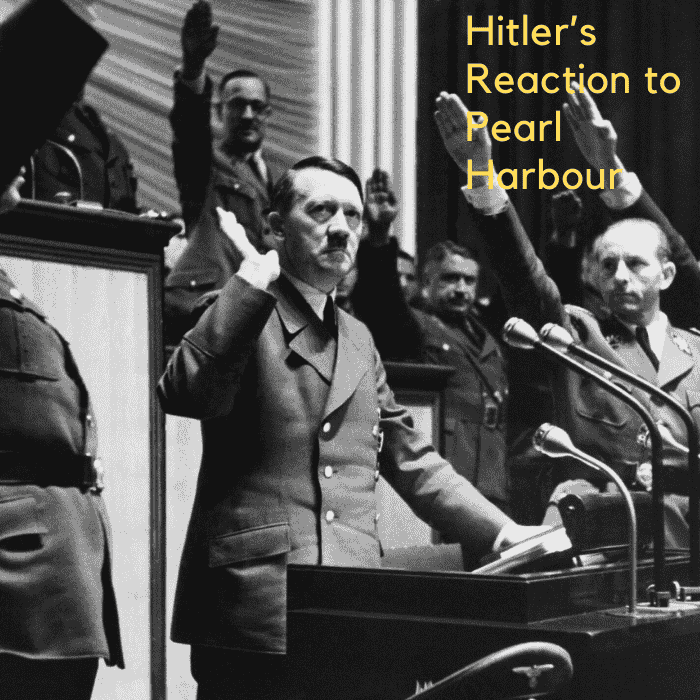
The attack on Pearl Harbor by the Japanese on December 7, 1941, sent shockwaves across the world, forever altering the course of history. For the United States, it marked the entry into World War II. But what was the reaction of Adolf Hitler, the dictator of Nazi Germany, to this unprecedented event? Was he pleased by Japan’s assault on a powerful Western nation, or did he have concerns about the strategic implications? The truth is more complicated than one might expect.
A Moment of Surprising Restraint
In the immediate aftermath of the Pearl Harbor attack, many assumed Hitler would rejoice at the suffering of one of the United States’ most strategic military bases. After all, Japan and Germany were allies within the Axis Powers, bound by a pact of mutual support. However, Hitler’s reaction to Pearl Harbor was far from celebratory. Rather than immediately focusing on Japan’s success, Hitler’s response was deeply rooted in strategic concerns.
For one, Hitler understood that the attack on Pearl Harbor would trigger a full-scale response from the United States. While Japan had undoubtedly struck a significant blow against the U.S. Navy, Hitler was acutely aware of the industrial power and military potential of the United States. The more pressing issue for him was not the humiliation of the U.S., but the possibility of strengthening his enemies.
Strategic Implications for Nazi Germany
Hitler had always been a calculating leader, and even though the United States was an adversary, he was more concerned with the broader impact of the attack. His fears were rooted in the balance of power in Europe and the growing tensions between the Axis and the Allied forces. With Japan attacking the U.S., Hitler was suddenly facing a two-front situation that would require more careful management.
The war in Europe was already challenging for Nazi Germany, and Hitler understood that the involvement of the United States could tip the scales in favor of the Allies. He had long underestimated the capabilities of the U.S. military, but the attack on Pearl Harbor forced him to reassess the situation. If Japan’s action led to a full American mobilization, Hitler knew the United States would be a formidable opponent both in Europe and the Pacific.
Hitler’s Decision to Declare War on the United States
Despite his initial reservations, Hitler made a crucial decision shortly after Pearl Harbor: he declared war on the United States. The reasons for this decision are still debated by historians, but one theory is that Hitler believed it was inevitable. He was convinced that if Japan’s attack on Pearl Harbor brought the U.S. into the war, then the Axis powers might need to unite and take on the global superpower together.
This decision to declare war on the United States was not only a strategic blunder but also one that marked the beginning of the end for Nazi Germany. The U.S., with its vast industrial resources and military might, was soon able to direct its focus toward defeating the Axis powers. Germany’s entry into the war against the U.S. opened the floodgates for American involvement in both the Pacific and European theaters, dramatically altering the balance of power.
The Dangers of Underestimating the U.S.
Hitler’s initial assessment of the United States as a potential non-threat, especially after Pearl Harbor, was part of a larger miscalculation. While he admired the military potential of the Japanese, he had underestimated how quickly the U.S. could respond to a threat on its soil. The Pearl Harbor attack proved to be a catalyst for America’s massive war effort, and it was an effort that would prove devastating to the Axis.
In retrospect, Hitler’s decision to declare war on the United States was perhaps his greatest strategic mistake. Not only did it ensure the entry of the U.S. into the European conflict, but it also opened the door for the eventual collapse of Nazi Germany. The U.S. and its allies would go on to launch a series of decisive campaigns, eventually culminating in the fall of Berlin in 1945.
Conclusion: A Turning Point in Global History
The attack on Pearl Harbor fundamentally shifted the direction of World War II. For Adolf Hitler, it was both a moment of cautious recognition and a fateful decision. While he initially expressed concerns about Japan’s growing power, he ultimately aligned himself with the Axis pact and declared war on the United States. This decision marked a turning point in the war and sealed the fate of Nazi Germany. By underestimating the strength of the U.S. and failing to foresee the global consequences of Japan’s actions, Hitler sealed his own doom and that of his regime.
